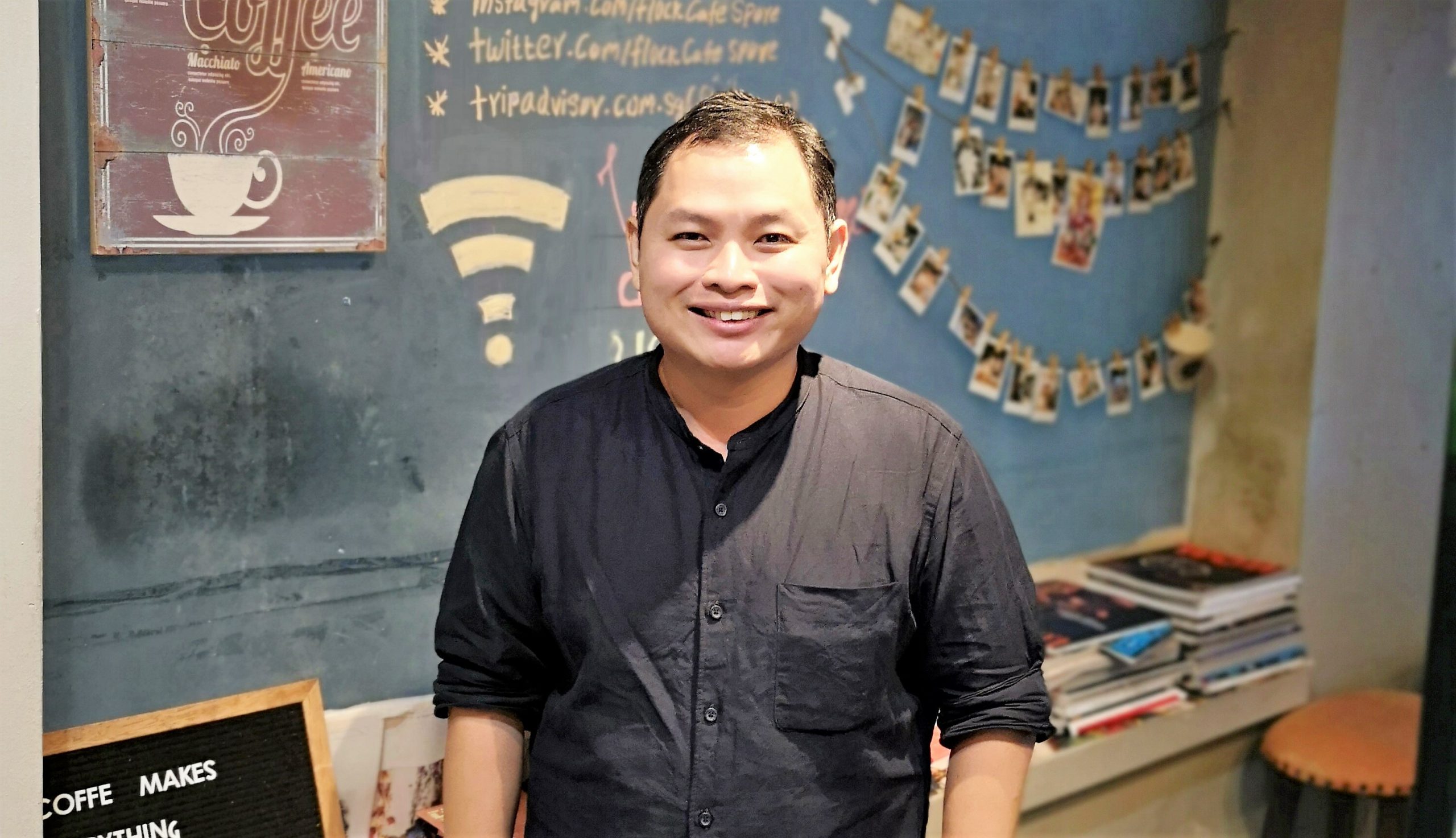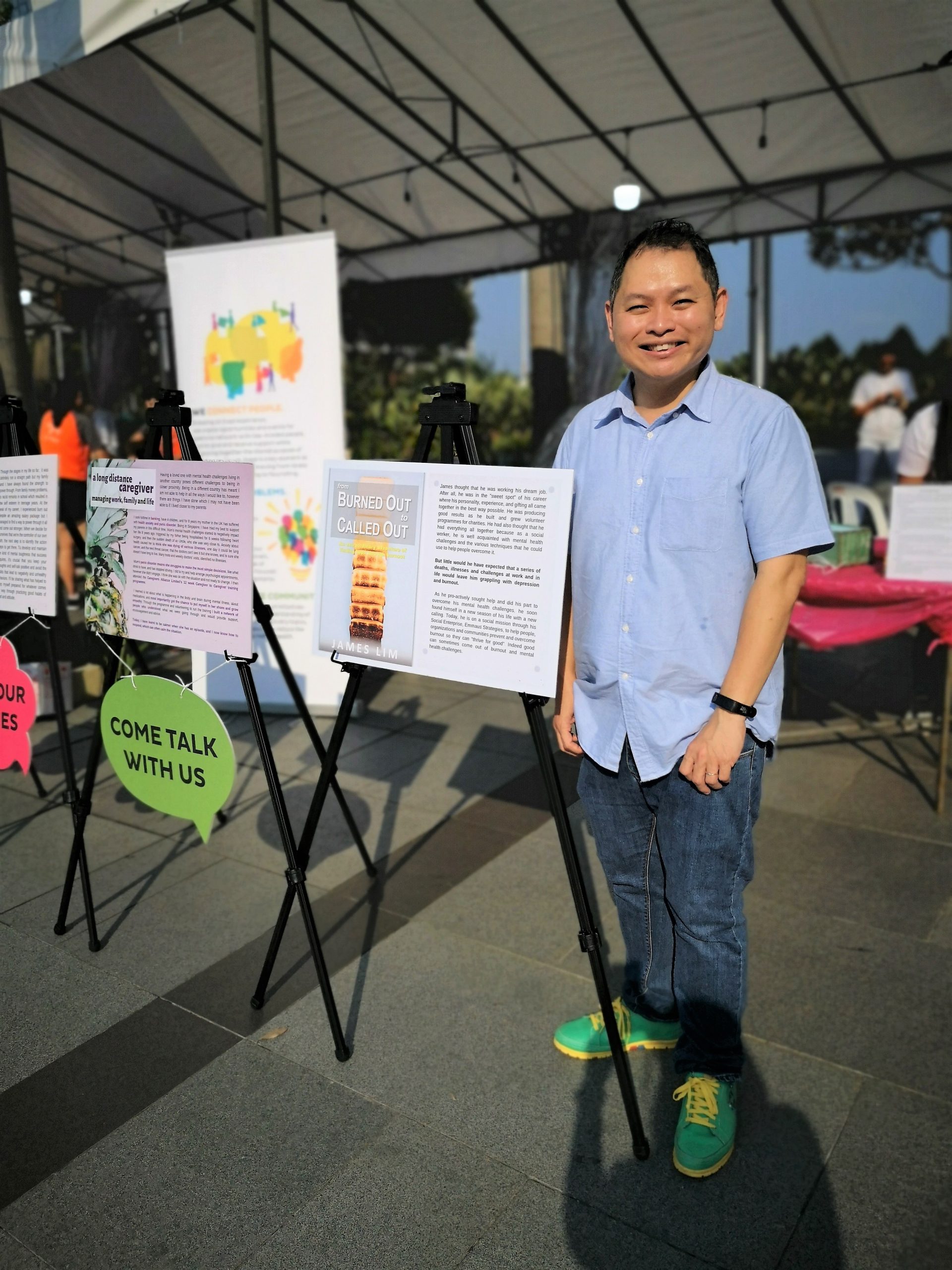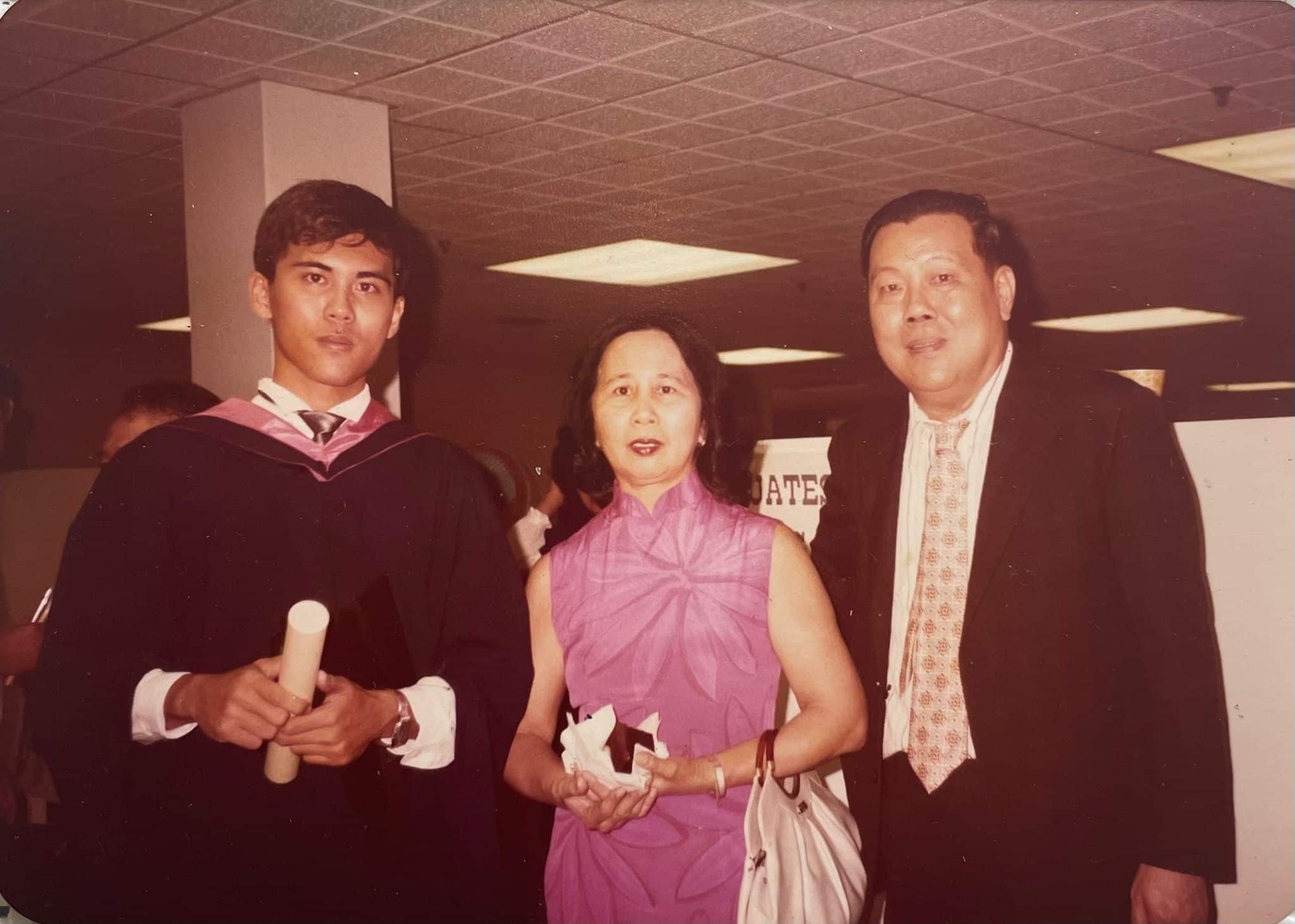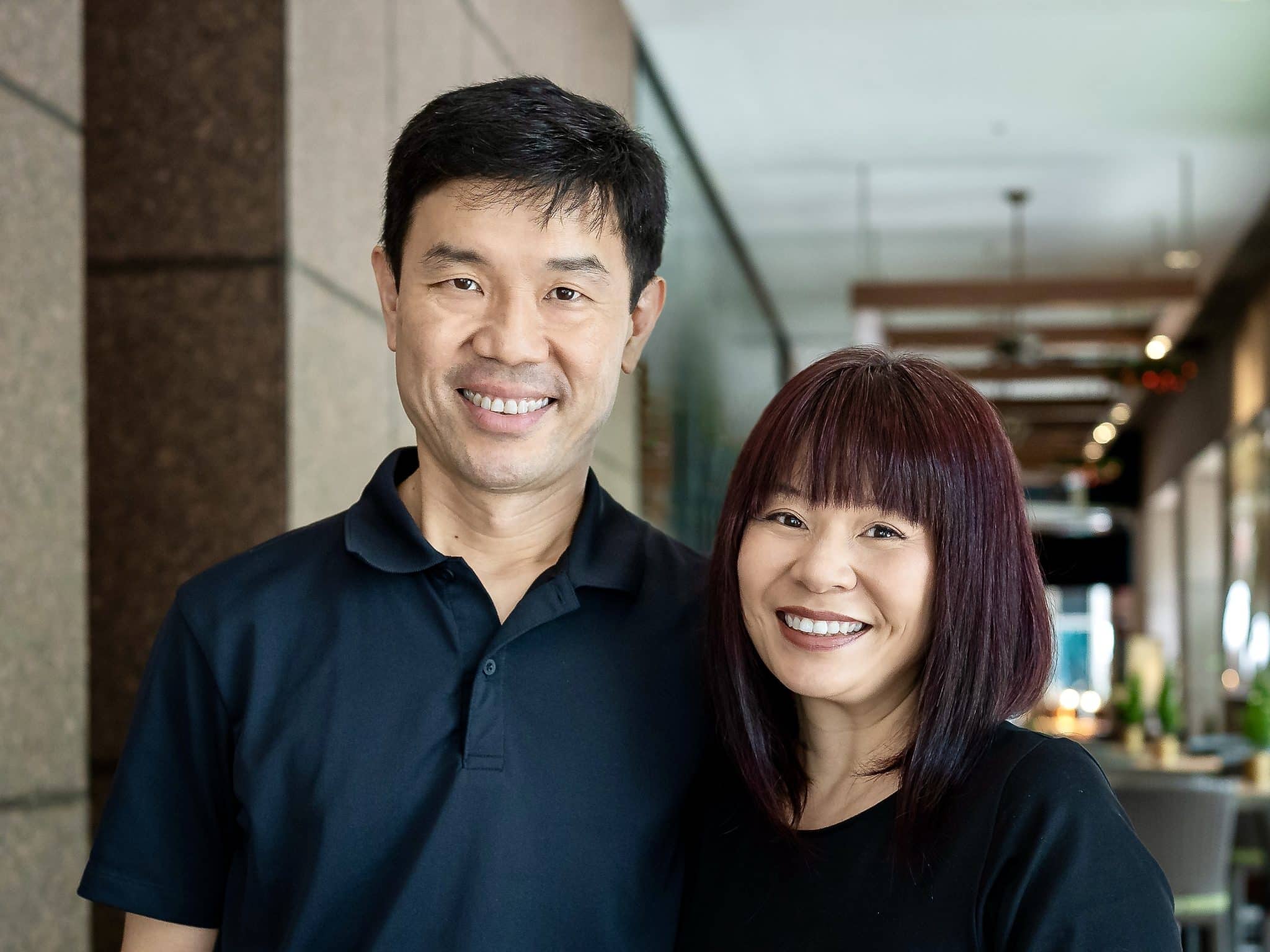Burnt out so many times he lost count, now he helps others build mental resilience
by Christine Leow // May 21, 2021, 5:22 pm

Joking that he is an "expert at burnout", James Lim was motivated to start a social enterprise to help others build mental resilience. All photos courtesy of James Lim.
James Lim had wanted to be a social worker his whole life.
When he started working as a medical social worker in a hospital in 2002, he thought his dreams had come true.
But the next year, he would find himself in the thick of one of the worst health crises Singapore had seen then – Severe Acute Respiratory Syndrome (SARS).
“It was overwhelming for a young worker,” said Lim, now 42.
“I always tell people I am an expert at burnout.”
Working through that season would cause him to experience the beginnings of a burnout though he did not know it then, because, despite the stress and long hours, he loved his job.
“As a rookie, I hadn’t developed the emotional maturity to handle the demands of the role.”
It would take several more jobs and encounters with burnout before Lim recognised it for what it was.
Today, he is the founder of Emmaus Strategies, a social enterprise that trains people, organisations and communities through workshops and resources to be resilient and to thrive.
“When I introduce myself at workshops, I always tell people I am an expert at burnout! I have burnt out at least five times but I have stopped counting.”
Started in 2017 as part of its aim to “fuel good”, the organisation also helps charities to better partner with their volunteers.
Preparation for the tough journey
Lim’s unlikely journey from social worker to social enterprise owner is, in his own words, his road to Emmaus (Luke 24:13-35).
“Jesus met the two disciples on the road to Emmaus while they were at their lowest. They were disillusioned because a lot of things had happened and their Messiah had been crucified.
“But Jesus went on a journey with them and, by the end of the journey, they recognised Him.”
That about sums up Lim’s journey, too.
Twelve years before the burnout that ultimately drove him to start a social enterprise, he had his first real encounter with God.
“I felt overwhelmed and did not think I could get burnout from something I was passionate about.”
Raised in a Christian family who went to church because “it was a Sunday thing”, Lim was baptised at the age of 12. Soon after, though, he stopped going to church because his family stopped going.
“I used to joke that my family was very united. We all backslid at the same time.”
The years would pass and while there was “always a part of me that wanted to go back to church”, Lim never did.
“I had a few encounters with people who thought negatively about backsliders and it made me afraid of going back to church. I had this fear of being judged.”
In 2005, Lim would find himself at a low point in his life.
“I was going through some crisis at work and in my friendship. There was a lot of stress and I had to leave a job that I really loved.”
He was experiencing his first major burnout.
“I felt overwhelmed and did not think I could get burnout from something I was passionate about. But I was wrong.”
Then came an unlikely invitation.
“I had a supervisor in my first job who used to tell people, ‘Don’t tell me anything about Jesus’, not that I ever did. But she suddenly asked to meet up with me.
“I met her and realised that she had had an encounter with Jesus. She invited me to an event in her church. She said these very words to me, ‘God has not forsaken you, have you forsaken Him?’”
Lim accepted her invitation to church.
“The sermon that Sunday was From Burnout to Balance. That sermon brought me back to God and kickstarted my healing.”
But God had more in store for him. During the service, Lim had somehow lost his wallet in the church. His ex-supervisor found it and, along with her life group, drove to deliver the wallet to him.
“I wanted to hear what God wanted to teach me about healing from my burnout.”
“When she gave me back the wallet, she said, ‘I hope you will be like your wallet, once lost now found.’”
Travelling home on the MRT, Lim settled to read the book his ex-supervisor had given him, The Purpose Drive Life by Rick Warren.
“The first few pages of the book talked about how God considers 40 days as a spiritually significant time period. Whenever God wanted to prepare someone for his purposes, he took 40 days.
“I had served notice at my old job without another job lined up and someone had just offered me a new job in volunteer management. I thought it was for something I was not trained at. So, I wasn’t sure if I should take up the job.
“But, as I counted the days from my last job to when I would start my new one, I realised it was exactly 40 days. I felt God had called me to the job.”
Lim would start work at a Christian organisation and return to Christian discipline in earnest as well.
“I was having department devotions on Tuesdays and HQ devotions on Thursdays, cell group on Fridays, over and above Sunday service.
“Up until then, I used to sleep in on Sundays and thought that I might stop going to church because it was so far away and I wasn’t ready to lose my precious sleep.
“But I continued to return to church week after week because I wanted to hear what God wanted to teach me about healing from my burnout and low self-esteem.”
Lim would eventually serve in cell group ministry.
Down but not out
Lim’s return to church would also give him the resources for what was about to come … and a partner in life. He met his wife at his cell group and the pair married in 2011.

The birth of Lim’s first son helped him emerge from his depression. It was his children who motivated Lim to recover from his burnout because he did not want them to bear the brunt of his dark moods when he was feeling down.
That was the year that Lim also fell into depression because of “a series of things that happened” in quick succession.
There was the stress of preparing for the wedding and their new home. Then, Lim’s father was diagnosed with cancer.
“It was a challenging period. I had to prepare for my wedding while being worried about my father’s health, making arrangements for his care, shuttling to and from the hospital to visit my father while he was hospitalised and taking him for treatments after he was discharged.”
Then, his father passed away and his wife also lost someone on her side of the family.
Meanwhile, Lim was leading a cell group and facing challenges both at work and in church ministry.
“My wife saw that I was really in a bad shape, not the usual James. I slept more. I wanted to escape. If I could avoid people and sleep it off, I would do that.
“I felt very sad and gloomy every day and I felt like this the majority of the time. It even felt emotionally painful with each breath I took. It was bad.”
Soon, his condition began to affect his relationship, although not his work.
“I could still perform at work because that was my distraction. That was why my depression went under the radar.”
“I started to dread life and feel that it’s not worth living.”
Eventually, his wife convinced him to seek professional help.
“I had resisted help because, being a social service personnel, I should have been able to handle this, I should have had this under control.
“I realised much later that my pride and ego really got in the way of my seeking help earlier.”
Lim was diagnosed with clinical depression and put on medication. But the road to some measure of normalcy would take another three to four years.
“People dealing with mental health conditions often describe it like being in a tunnel and not knowing when the light at the end of the tunnel would come.
“I would wonder what else would work to get me out of this terrible state, or how long it would take.
“I started to dread life and feel that it’s not worth living and that I might be better off ending it. The thoughts crossed my mind several times.”
In 2014, Lim quit his job to focus on restoring his mental health. But, bereft of his sole distraction, he found himself plagued by more negative thoughts.
“I always had low self-esteem because I grew up in quite a volatile environment.
“My parents did their best for their kids. But there would be the occasional conflicts which often left me yearning for affirmation and affection.”
One day, while on the MRT, Lim saw people laughing and smiling and felt even worse about himself.
“Questions like, ‘Why is this happening to me? Why am I like that? Why can’t I be happy like other people?’ came.
“I almost broke down and cried in public. But I held back my tears.”
It got to a point where Lim was so depressed that he got angry with God.
“He was using this to grow my faith in Him.”
“I actually made a decision. I told Him, ‘I don’t believe in You anymore. You don’t exist.’
“But I didn’t last more than two days. I couldn’t bring myself to say He isn’t real, simply because I have experienced God personally working in my life in the last few years.
“I was coming to the end of myself. I had exhausted all means and I realised there was nothing I, or even others, could do to help. I turned my attention to God.”
He challenged God: “If You are real, I will open the Bible and I will find You. If You are real, show Yourself to me.”
As Lim read the Bible and journalled his thoughts, thanksgiving flowed. He ended up writing devotions.
“I sent the devotions to my friends. It was the beginning of my writing.
“He was using this to grow my faith in Him and grow my other skills and giftings such as writing.”
This would later lead Lim to create his own training material, adding another step towards the start of Emmaus Strategies.
Within eight months of resigning, Lim was hired for a new job – to be a volunteer manager with a charity organisation. It was one that he was sure God had provided.
“I had left my old job without a job. I resigned in January and was getting anxious about not being able to get a job.
“I had calculated that my savings would be exhausted by August. Somehow, things worked out and I was given an offer to start my new job, miraculously, in August.”
The skills acquired in this new job would later be used to create Emmaus Strategies’ volunteer partnership arm. Slowly, God was leading Lim down the road to starting the social enterprise.
A personal Emmaus encounter
For three years, Lim was happy at his job once more. Then, in 2017, he ended up at the A&E department twice in a month.
“I was breathless and they diagnosed me with pneumonia. Though I grew up with asthma, I had never had pneumonia before.”
Lim did not connect his condition to burnout until a colleague jokingly remarked that that he might be over-worked.
“I was putting in long hours because I loved the job and felt that it was an area of work God had called me to do. The remark made in jest made me think. I realised I was burnt out.”

Lim at a roadshow where he shared his story.
So, Lim began to take better care of himself. The self-confessed perfectionist tried to take things easier and to manage his own expectations.
When none of it helped, he quit his job to concentrate on dealing with his burnout. But as he researched and attended workshops, he realised that not a lot of material was available on burnouts.
“I wouldn’t give this journey up for another journey, even though it has been a very difficult one.”
Lim decided to do something to help others like him. As he sought God about his decision, he was brought to the passage on the Road to Emmaus (Luke 24:13-35) where the disciples, discouraged and disillusioned, met Jesus. By the time their journey was done, the disciples were transformed by their encounter.
Lim felt that it was exactly the experience he wanted others to have – to encounter God at their lowest and be transformed. So, he decided to start a social enterprise that would offer biblically-based workshops for people struggling with burnout. He would call it Emmaus Strategies.
“We want to join others in their journey with God, to bring them to a point where their hearts are reignited by God.
“God used my own experience to help me grow my own resilience and subsequently to grow the social enterprise.
“It has been an amazing journey. I wouldn’t give this journey up for another journey even though it has been a very difficult one.”
The Walk
In the beginning, the going was tough. Lim had no business experience.
“I was a rookie. I had to apply to ACRA, think of my business USP, grapple with terms like ‘pivot’.
“I was suffering from entrepreneur’s insomnia because my brain was constantly thinking about the business like how to set up the business, how to create meaningful impact.”
Lim also had a difficult time getting clients on board.
“I realised that as early as 2005, God was already equipping me to do this.”
“People know it’s important to develop mental resilience, but they may not choose to set aside resources for it.”
Slowly, though, Emmaus Strategies began to carve out a place for itself. Then, Covid-19 struck.
Although it brought the importance of mental health and mental resilience to the fore, that did not mean more business for Lim.
“I went through a tough time because all my projects got cancelled. I was badly hit by Covid-19.”
But it was through the difficulties that Lim saw God’s hand in his life in other ways.
In the lull when business was slow, Lim developed new material, including quizzes, to test for burnout – this included the PRISM model and a 12-day devotion, The Walk, to encourage those struggling with burnout.
“The Walk was written over 12 days, 12 years after my first burnout. I realised that, as early as 2005, God was already equipping me to do this.”

Lim conducting a workshop to build mental resilience.
Lim also used his experience as a volunteer manager to move into volunteer partnerships, putting the two aspects of Emmaus Strategies under the umbrella goal of fuelling good.
At the end of 2020, after a year of holding things together despite the pandemic, Lim encountered personal setbacks.
One of his family members developed a neurological condition that, though temporary, resulted in behavioural issues. Then his mother was knocked down by a car. Lim fell into depression once more.
“It was quite bad. I was so overwhelmed, I wanted to run away. I thought of ending my life.”
Again, Lim sought help from his psychiatrist, his counsellor and a Christian counsellor. But, this time round, he had one more resource gleaned from past experiences.
“If not for the resilience that God has helped me to build up previously, I would not be here sharing my story.”
“One thing I took out of my whole depression episode is that the main change agent is God. You can seek help, but if God is missing in the whole thing, you can’t recover.”
So, Lim is mindful to keep God at the centre of his life. He daily practises the spiritual disciplines of thanksgiving and journalling.
He also has a close Christian friend with whom he meets weekly to pray together.
This year, he added part-time work as a manager in children and youth services to his portfolio. Though his plate is full – raising two sons, caring for his elderly mother, running his business, working part-time – he has not just been able to manage, he has thrived.
“God has helped me and it is inexplicable how I am able to navigate these different roles now and yet feel relatively more rested than when I was just running my social enterprise.”
“Over the years, God has helped me to build my resilience. Yes, I still buckle a little under pressure here and there. But, if not for the resilience that God has helped me to build up previously, I would not be here sharing my story.”
How to prevent and manage burnout
The ART of thriving is a system offered by Emmaus Strategies to prevent and manage burnout.
A: Awareness
Before help can be sought, you need to be aware of your condition.
There are two tests that you can do to see if you are suffering from burnout:
There is a talk available, From Stress to Zest.
R: Resilience
This is what you can do to build mental resilience:
- There is a Self-Talk Audit to see if your self-talk is bringing you down.
- Also available are the PRISM model and The Walk devotions which are resources for building mental resilience and keeping you centred on God through your journey with burnout.
- There is a workshop on mental resilience that you can sign up for called Café Wowee.
T: Transformation
If you are looking for in-depth guidance to grow your mental resilience:
- Download the COVID-19 Mental Resilience Thriving Kit
- There is a retreat available upon request, for a deeper understanding of mental resilience, as well as one-to-one coaching.
RELATED STORIES:
“How do I help a friend with depression?” And other questions we posed to psychiatrist Dr Leslie Lim
He tried to run away, but God taught this ultra-marathoner to run from depression instead
“How do I help a friend with depression?” And other questions we posed to psychiatrist Dr Leslie Lim
We are an independent, non-profit organisation that relies on the generosity of our readers, such as yourself, to continue serving the kingdom. Every dollar donated goes directly back into our editorial coverage.
Would you consider partnering with us in our kingdom work by supporting us financially, either as a one-off donation, or a recurring pledge?
Support Salt&Light



